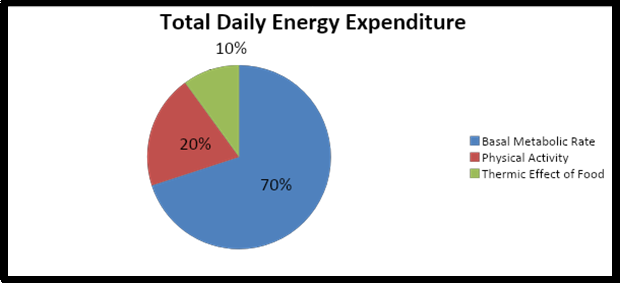 I have come across many people over the years who believe eating before bed leads to weight gain. The general idea is that our body slows down when we sleep and stores calories eaten at night instead of using them as energy. Is there any truth to this assumption? Yes, and no. Our bodies do indeed slow down during sleep, but not as much as you would think. The real reason for possible weight gain has to do with the thermic effect of food. In this blog, I will talk about the thermic effects of food and weight gain and whether or not eating before bed causes negative metabolic changes in insulin sensitivity, cholesterol levels, and high glucose levels. I will start by talking about resting metabolic rate and sleep..
I have come across many people over the years who believe eating before bed leads to weight gain. The general idea is that our body slows down when we sleep and stores calories eaten at night instead of using them as energy. Is there any truth to this assumption? Yes, and no. Our bodies do indeed slow down during sleep, but not as much as you would think. The real reason for possible weight gain has to do with the thermic effect of food. In this blog, I will talk about the thermic effects of food and weight gain and whether or not eating before bed causes negative metabolic changes in insulin sensitivity, cholesterol levels, and high glucose levels. I will start by talking about resting metabolic rate and sleep..
Resting Metabolic Rate and sleep
The amount of energy we burn at rest is called the resting metabolic rate. This calculation excludes any movement or digestion of food. When we sleep, our metabolic rate is lower than at any other point throughout the day because we need less energy to sustain ourselves. This does not mean that our metabolism comes to a crawl. Maintaining all of our organs requires a lot of energy.
Our fuel source when sleeping shifts from fats to carbohydrates
- Fat oxidation is a process where fat molecules are broken down into their smaller parts and can be used for energy storage. Stored fat must be broken down before we can use it for energy.
Researchers using 12 males who slept overnight in a lab studied the sleeping metabolic rate of the participants throughout the night. It was found that as the night progressed, energy expenditure decreased (they were burning fewer calories as the night went on). This likely resulted from a noticeable decrease in the breakdown and utilization of fat for energy. As the subjects approached the time they woke up, fat oxidation continued to decrease while carbohydrate oxidation gradually increased and peaked 30 minutes before waking (stored carbohydrates were being used for energy, thereby increasing resting metabolic rate). The brain’s primary fuel source comes from carbohydrates, so it is possible that an increase in brain activity in certain stages of sleep was responsible for the increased use of carbohydrates for energy.
Fasting and eating before bed may affect the rate of both fat and carbohydrate oxidation (we will use differing amounts of fat and carbohydrates when asleep, which can affect the total amount of calories we burn throughout the night). There are no studies that address this specific issue that I could find. The secretion of growth hormones while asleep is assumed to play a large role in the production and utilization of carbohydrates at different times throughout sleep.
Influence of nighttime eating on morning hormone levels
An important factor to consider with nighttime eating is whether or not it influences hormone levels (like insulin) and cholesterol levels. One study had subjects eat 150 calories before bed as either protein or carbohydrates and found that the nighttime snack did not negatively alter fasting blood glucose levels, HDL cholesterol, or triglycerides, but did increase LDL (the bad kind) cholesterol (2). This study also found that insulin resistance was increased when consuming the snack before bedtime (insulin resistance increases the risk of diabetes). An important factor to keep in mind is that this study was conducted using sedentary, obese women. Active subjects of healthy weight may produce different results.
A study using young, active college-aged males found that eating roughly 150 calories before bedtime increased morning resting expenditure (speeds up the metabolism) compared to subjects that did not eat before bedtime (3). The study also found that there were no differences in subjects consuming carbohydrates or protein before bed.
One study also found that a meal consumed at night produces a higher glycemic/insulinemic response (increase in blood sugar and increase in insulin secretion, respectively; both are bad). The movement of food from the stomach to the intestines was found to be slower at night than in the morning, causing an increase in the efficiency of dietary carbohydrate absorption. This may lead to reduced synthesis of glucagon (glucagon helps break down stored glucose into glucose we use as energy), which would lead to a reduction in glucose-induced thermogenesis, thereby decreasing calories expanded in the evening (6). Basically, since we use the carbohydrates from food consumed for energy instead of through the breakdown and release of our stored glucose, less energy is expended.
Eating earlier in the day may lead to weight loss
A few newer studies showed a slight increase in weight loss in groups eating the majority of their calories earlier in the day, compared to the groups consuming more calories at night. These were not laboratory studies and relied on self-reported levels of caloric intake and physical activity. Without controlling for these factors, the conclusions of these studies may be seriously flawed.
Eating before bed MAY reduce your intake of food in the morning
Have you noticed that if you do not eat close to bedtime, you wake up very hungry? I am sure this varies by person. Personally, I notice that I am hungrier the next morning if I do not eat within a few hours of going to bed. A previously mentioned study giving subjects 150 calories of protein or carbohydrates before bed found that subjects had increased feelings of fullness and less hunger the following morning compared to subjects that did not eat before bedtime. One downside to this is that this feeling of fullness may lead to people skipping breakfast, which has been shown to lead to weight gain by overeating throughout the day.
Most of the early studies used shift workers
A majority of the older studies linking nighttime eating with weight gain, increased risk of diabetes, and an unfavorable lipid profile used shift workers and people with a disorder called night eating syndrome (people that eat large quantities of food all night). Why is there a problem using these groups? Shift workers tend to report more erratic sleep and less overall sleep than non-shift workers. Night eating disorder is marked by a tendency to eat most of the daily calories at night or awake from sleep in the middle of the night to eat. It is also characterized by a depressed mood and/or difficulty sleeping (1).
These two groups of people are less than ideal to use because they both show irregular sleeping patterns. Less sleep has been linked to obesity and overeating. Although the exact cause is not known, it may be because people are up for more hours and therefore have more time to eat. Having depression can also lead to overeating.
If you leave out the studies using subjects with nighttime eating disorders and late-night shift workers, you are left with mostly animal studies linking nighttime eating and metabolic disturbances. As I have mentioned in many of my other blogs, I have an issue with generalizing the results of studies using mice to humans. Of course, it is still possible that nighttime eating leads to metabolic problems; I just think many of the older studies are flawed.
The link between our circadian rhythm and the Thermic Effect of Food
- Circadian rhythm-cycle telling our bodies when to sleep, wake up and eat.
- Thermic Effect of Food– the energy we spend to break down and absorb nutrients from food
While doing research for this blog, I was becoming disappointed by the lack of concrete answers regarding eating before bedtime and weight gain. Luckily, I eventually stumbled upon a very interesting article that talks about our natural circadian rhythms and how they influence the thermal effects of food.
Before I even begin discussing the article, you should know that they are measuring the thermal effect of food, which makes up 10% of your total energy used. It is not a very significant amount, as you can tell by the pie chart I made below. Let’s say you require 2500 kcal a day to maintain your weight, and you are not trying to lose weight. Ten percent of that 2,500 kcal is 250 kcal per day.
The study found that the thermic effect of food was 35% higher in the morning. I do agree with their findings that the thermic effect of food may be higher in the morning because of our circadian rhythm and endogenous system timing. Let’s go back to the 250 kcal number from the previous paragraph. A 35% increase would amount to 88 kcal a day. If we go with the assumption that burning 3500 kcal’s equals a weight loss of one pound, it would take 40 days for that 88 daily kcal increase to result in weight loss of a pound. That is nine pounds a year, which is a significant amount of weight loss

The macro nutrient makeup of the meal affects the Thermic Effect of Food
Protein has the highest energy cost, meaning eating a protein meal causes your body to burn more calories digesting and absorbing the protein than it would had you eaten the same amount of calories from a fat or carbohydrate. Fat has the lowest energy cost, and carbohydrates fall between fats and proteins.
Exercise may offset any negative effects of nighttime eating
Daily exercise appears to offset some of the negative effects that eating at bedtime may cause, namely decreasing insulin sensitivity throughout the night (4). A study gave obese women whey protein, casein protein, or carbohydrates (all types were 150 kcal) 30 minutes before bed and measured the effect on metabolism, lipid levels, and insulin levels. The study also had the former sedentary women engage in regular exercise throughout the duration of the study.
The study found that none of the three groups experienced any negative changes in fasting blood glucose, lipid levels, insulin levels, or hormonal markers (a few previous studies found these markers to be negatively affected by bed-time feeding). The authors of the study believe that regular exercise may have offset any negative changes eating at bedtime may cause (a nighttime rise in insulin may lead to greater insulin resistance in the morning). The protein groups showed a higher morning metabolism than the carbohydrate group, although this effect was not significant.
Discussion
This topic turned out to be fairly controversial. I highlighted many studies that found a link between nighttime eating and weight gain, but there were also many studies that found no link between nighttime eating and weight gain. Some of the more consistent findings are:
- If eating the same meal in the morning and in the evening, we likely expend more energy (and burn more calories) digesting and utilizing the morning meal (Thermic Effect of Food). Although small, this difference can lead to weight loss over months or years.
- The size of the meal eaten and the macro nutrient make up of the food are very important factors related to weight loss. Protein has the highest energy cost to breakdown.
- A small meal (150 kcal) before bedtime may lead to morning feelings of fullness and an increased morning energy expenditure (burning more calories in the morning).
So, would I recommend eating before bedtime? A small meal, yes. It may be better to eat larger meals earlier in the day and eat lighter meals around bedtime, owing to the higher thermal effects of food seen in the morning
- I know this article was more dense than usual. I tried my best to simplify everything. If you have any questions please leave a comment or email me.
Sources
-
Katayose, Y., Tasaki, M., Ogata, H., Nakata, Y., Tokuyama, K., & Satoh, M. (2009). Metabolic rate and fuel utilization during sleep assessed by whole-body indirect calorimetry. Metabolism, 58(7), 920-926.
-
Kinsey, A. W., Eddy, W. R., Madzima, T. A., Panton, L. B., Arciero, P. J., Kim, J. S., & Ormsbee, M. J. (2014). Influence of night-time protein and carbohydrate intake on appetite and cardiometabolic risk in sedentary overweight and obese women. British Journal of Nutrition, 112(03), 320-327.
-
Madzima, T. A., Panton, L. B., Fretti, S. K., Kinsey, A. W., & Ormsbee, M. J. (2014). Night-time consumption of protein or carbohydrate results in increased morning resting energy expenditure in active college-aged men. British journal of nutrition, 111(01), 71-77.
-
Ormsbee, M. J., Kinsey, A. W., Eddy, W. R., Madzima, T. A., Arciero, P. J., Figueroa, A., & Panton, L. B. (2014). The influence of nighttime feeding of carbohydrate or protein combined with exercise training on appetite and cardiometabolic risk in young obese women. Applied Physiology, Nutrition, and Metabolism, 40(1), 37-45.
-
Bo, S., Fadda, M., Castiglione, A., Ciccone, G., De Francesco, A., Fedele, D., … & Mengozzi, G. (2015). Is the timing of caloric intake associated with variation in diet-induced thermogenesis and in the metabolic pattern? A randomized cross-over study. International Journal of Obesity, 39(12), 1689-1695.
-
Morris, C. J., Garcia, J. I., Myers, S., Yang, J. N., Trienekens, N., & Scheer, F. A. (2015). The Human Circadian System Has a Dominating Role in Causing the Morning/Evening Difference in Diet‐Induced Thermogenesis. Obesity, 23(10), 2053-2058.




Rob, Call me at 973-756-7230 Teri, Your co-worker at Community Hope.